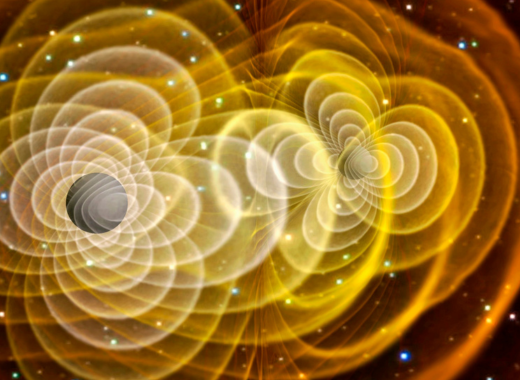- Reaction score
- 1,697
An Ongoing Meta-analysis of Gravitational Wave Signals may soon Prove that Space Remembers: permanent memory imprints in spacetime may soon be detected, which will be a validation of Nassim Haramein and our research team’s prediction that space has the property of memory, in which we described how the informational imprint of memory in space is what holographically generates time—that is to say that 4D spacetime is a hologram of a 3D voxel information network—as well as ordering properties underlying dynamics of organized matter.
An Ongoing Meta-analysis of Gravitational Wave Signals may soon Prove that Space Remembers: permanent memory imprints in spacetime may soon be detected, which will be a validation of Nassim Haramein and our research team’s prediction that space has the property of memory, in which we described how the informational imprint of memory in space is what holographically generates time—that is to say that 4D spacetime is a hologram of a 3D voxel information network—as well as ordering properties underlying dynamics of organized matter. The gravitational wave memory effect is a prediction of general relativity, and physicists have devised a test of this interesting spacememory effect via a meta-analysis of gravitational wave detector data. The presence of memory effects in gravitational wave signals not only provides the chance to test an important aspect of general relativity, but also represents a potentially non-negligible contribution to the waveform for certain gravitational wave events. As well, memory properties of space will have far-reaching implications, from probing theories of quantum gravity and unified physics to potential applications in telecommunications technologies.
Gravitational waves, oscillations or more colloquially “ripples” in the substantive medium of space-time, were first predicted by Albert Einstein’s theory of general relativity over a century ago. These waves may be quite ubiquitous, what is known as the gravitational wave background (GWB), similar to the cosmic microwave background (CMB). The gravitational waves that have been detected to-date are generated by some of the most violent and energetic processes in the cosmos, such as the merging of black holes and neutron stars. The ability to detect and analyze gravitational waves opens an entire new observational field potentially enabling scientists to probe into some of the most enigmatic regions of our universe, like the surface of Neutron stars and the event horizons of black holes. Gravitational waves could even offer insight into fundamental questions in physics; one possible probe of gravitational waves is to see if space itself has memory, referred to as the gravitational memory effect. As a lesser-known phenomenon related to gravitational waves, the gravitational memory effect has recently gained attention within the scientific community, and proposals have been formulated to analyze gravitational waves to detect potential spacememory effects. This article delves into the intriguing concept of gravitational memory and its implications for our understanding of the fundamental forces of the universe.

 spacefed.com
spacefed.com
An Ongoing Meta-analysis of Gravitational Wave Signals may soon Prove that Space Remembers: permanent memory imprints in spacetime may soon be detected, which will be a validation of Nassim Haramein and our research team’s prediction that space has the property of memory, in which we described how the informational imprint of memory in space is what holographically generates time—that is to say that 4D spacetime is a hologram of a 3D voxel information network—as well as ordering properties underlying dynamics of organized matter. The gravitational wave memory effect is a prediction of general relativity, and physicists have devised a test of this interesting spacememory effect via a meta-analysis of gravitational wave detector data. The presence of memory effects in gravitational wave signals not only provides the chance to test an important aspect of general relativity, but also represents a potentially non-negligible contribution to the waveform for certain gravitational wave events. As well, memory properties of space will have far-reaching implications, from probing theories of quantum gravity and unified physics to potential applications in telecommunications technologies.
Gravitational waves, oscillations or more colloquially “ripples” in the substantive medium of space-time, were first predicted by Albert Einstein’s theory of general relativity over a century ago. These waves may be quite ubiquitous, what is known as the gravitational wave background (GWB), similar to the cosmic microwave background (CMB). The gravitational waves that have been detected to-date are generated by some of the most violent and energetic processes in the cosmos, such as the merging of black holes and neutron stars. The ability to detect and analyze gravitational waves opens an entire new observational field potentially enabling scientists to probe into some of the most enigmatic regions of our universe, like the surface of Neutron stars and the event horizons of black holes. Gravitational waves could even offer insight into fundamental questions in physics; one possible probe of gravitational waves is to see if space itself has memory, referred to as the gravitational memory effect. As a lesser-known phenomenon related to gravitational waves, the gravitational memory effect has recently gained attention within the scientific community, and proposals have been formulated to analyze gravitational waves to detect potential spacememory effects. This article delves into the intriguing concept of gravitational memory and its implications for our understanding of the fundamental forces of the universe.

Gravity Wave Signals are being Analyzed to Detect Gravitational Memory Effect - Spacefed
An Ongoing Meta-analysis of Gravitational Wave Signals may soon Prove that Space Remembers: permanent memory imprints in spacetime may soon be detected, which



